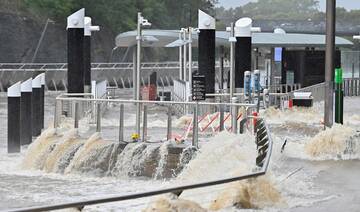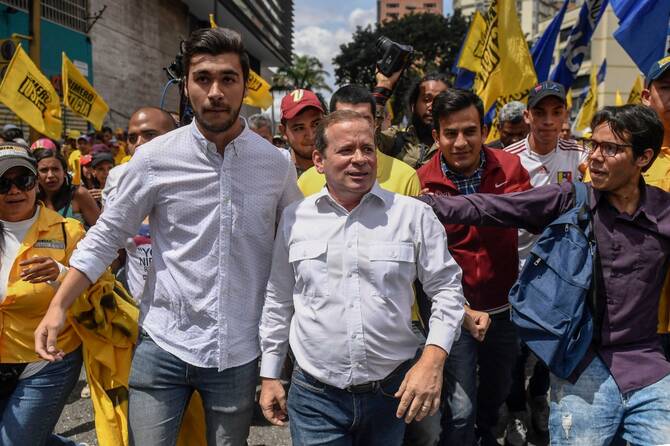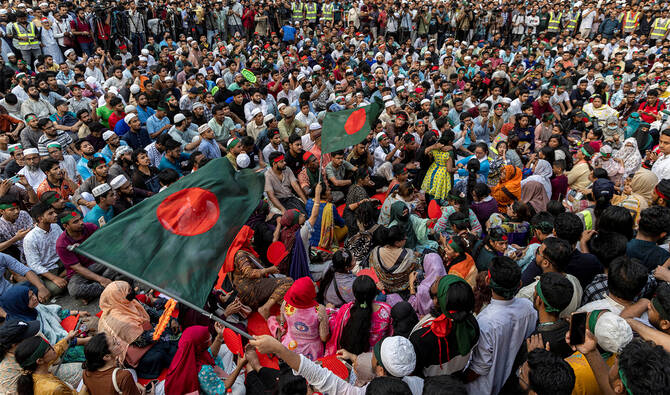WASHINGTON: The Trump administration revoked Harvard University’s ability to enroll international students in its escalating battle with the Ivy League school, saying thousands of current students must transfer to other schools or leave the country.
The Department of Homeland Security announced the action Thursday, saying Harvard has created an unsafe campus environment by allowing “anti-American, pro-terrorist agitators” to assault Jewish students on campus. It also accused Harvard of coordinating with the Chinese Communist Party, saying it hosted and trained members of a Chinese paramilitary group as recently as 2024.
“This means Harvard can no longer enroll foreign students and existing foreign students must transfer or lose their legal status,” the agency said in a statement.
Harvard enrolls almost 6,800 foreign students at its campus in Cambridge, Massachusetts, accounting for more than a quarter of its student body. Most are graduate students, coming from more than 100 countries.
Harvard called the action unlawful and said it’s working to provide guidance to students.
“This retaliatory action threatens serious harm to the Harvard community and our country, and undermines Harvard’s academic and research mission,” the university said in a statement.
The dispute stems from an April 16 request from Homeland Security Secretary Kristi Noem. The letter demanded that Harvard turn over information about foreign students that might implicate them in violence or protests that could lead to their deportation.

Homeland Security Secretary Kristi Noem salutes as she arrives at the commencement for the United States Coast Guard Academy, Wednesday, May 21, 2025, in New London, Connecticut. (AP Photo)
In a letter to Harvard on Thursday, Noem said the school’s sanction is “the unfortunate result of Harvard’s failure to comply with simple reporting requirements.” It bars Harvard from hosting international students for the upcoming 2025-26 school year.
Noem said Harvard can regain its ability to host foreign students if it produces a trove of records on foreign students within 72 hours. Her updated request demands all records, including audio or video footage, of foreign students participating in protests or dangerous activity on campus.
“This administration is holding Harvard accountable for fostering violence, antisemitism, and coordinating with the Chinese Communist Party on its campus,” Noem said in a statement.
The action revoked Harvard’s certification in the Student and Exchange Visitor Program, which gives the school the ability to sponsor international students to get their visas and attend school in the United States.
Students in Harvard College Democrats said the Trump administration is playing with students’ lives to push a radical agenda and to quiet dissent. “Trump’s attack on international students is text book authoritarianism — Harvard must continue to hold the line,” the group said in a statement.
The administration drew condemnation from free speech groups including the Foundation for Individual Rights and Expression, which said Noem is demanding a “surveillance state.”
“This sweeping fishing expedition reaches protected expression and must be flatly rejected,” the group said in a statement.
Noem’s sanction opens a new front in the Trump administration’s battle with Harvard. The nation’s oldest and wealthiest university, Harvard was the first to openly defy White House demands to limit pro-Palestinian protests and eliminate diversity, equity and inclusion policies.
The federal government has responded by cutting $2.6 billion in federal grants at Harvard, forcing it to self-fund much of its sprawling research operation. President Donald Trump has said he wants to strip the university of its tax-exempt status.
Many of Harvard’s punishments have come through a federal antisemitism task force that says the university failed to protect Jewish students from harassment and violence amid a nationwide wave of pro-Palestinian protests.
Homeland Security officials echoed those concerns in its Thursday announcement. It offered examples including a recent internal report at Harvard finding that many Jewish students reported facing discrimination or bias on campus.
It also tapped into concerns that congressional Republicans have raised about ties between US universities and China. Homeland Security officials said Harvard provided training to the Xinjiang Production and Construction Corps as recently as 2024. As evidence, it provided a link to a Fox News article which in turn cited a letter from House Republicans.
Ted Mitchell, president of the American Council on Education, called the latest action an “illegal, small-minded” overreach.
“I worry that this is sending a very chilling effect to international students looking to come to America for education,” he said.
The Trump administration has leveraged the system for tracking international students’ legal status as part of its broader attempts to crack down on higher education. What was once a largely administrative database has become a tool of enforcement, as immigration officials revoked students’ legal status directly in the system.
Those efforts were challenged in court, leading to restorations of status and a nationwide injunction blocking the administration from pursuing further terminations.
























